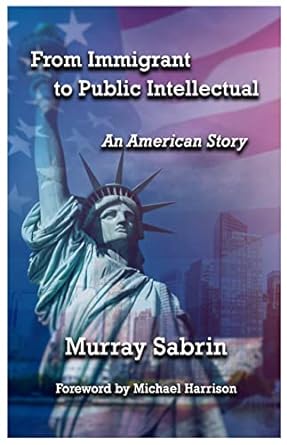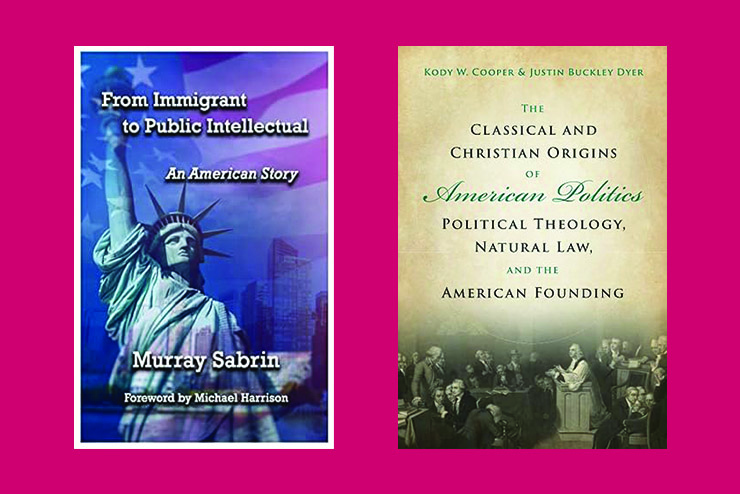
From Immigrant to Public Intellectual: An American Story, by Murray Sabrin (Talkers Books; 175 pp., $6.99) Murray Sabrin’s autobiography is an easily read account of immigrants who came to America from worn-torn Europe, expecting to lift themselves up by their bootstraps. The scion of a Polish Jewish family, some of whose members died in the Holocaust, and someone who arrived with his parents and older brother from West Germany in a military transport plane in 1949, Professor Sabrin and his family viewed America as an admirable land of opportunity. They harbored no grudges against the continent they left but viewed the U.S. as a place where they could succeed socially and professionally.
The author was especially bedazzled by the promise of liberty he discovered embedded in the American founding. And he dedicated himself to restoring limited government in the U.S. and battling a metastasizing welfare state. Sabrin became an economic libertarian, a student of Murray Rothbard, and a long-serving and deeply respected professor of economics at Ramapo College of New Jersey.
He also became a fixture in New Jersey’s Libertarian Party, and in 1997, he ran a colorful campaign for the governorship against the Republican incumbent Christine Todd Whitman. Sabrin used the campaign, from which he emerged with only 4.7% of the vote, to educate the public on how limited constitutional government should operate. He entered other campaigns, for example, against Democratic Senator Jon Corzine in 1999, and, in the ensuing contest, fared no better than he had against Whitman. But again, his token opposition was meant to instill moral and political lessons.
(Paul Gottfried)

The Classical and Christian Origins of American Politics: Political Theology, Natural Law, and the American Founding, by Kody Cooper and Justin Dyer (Cambridge University Press; 270 pp., $34.99). Professors Kody Cooper and Justin Dyer begin their new book by discussing Nietzsche’s infamous observation that God is dead. What Nietzsche really meant, the authors explain, is the eventual “death of the theological tradition that underpinned core liberal rights we take for granted.” This included “basic human dignity, natural rights, the reality of goodness, the reliability of reason, and moral agency grounded in free will.”
Although the German philosopher is not mentioned again, his prophecy relentlessly haunts the reader throughout the authors’ investigation of the American founding. In this well-researched text, the authors convincingly demonstrate that “the animating ideas of the American founding were deeply indebted to the Christian natural-law tradition.” This is because most founding thinkers were practitioners of this tradition, and those who maintained an “idiosyncratic view of Christianity or remained philosophically or religiously skeptical” still benefited from operating within its hegemony.
In making this argument, Cooper and Dyer reject the Straussian interpretation that insincere nods towards religiosity among the Founding Fathers can be dismissed as esotericism. They rely primarily on textual analysis of Founding-era pamphlets, university curricula, sermons, speeches, treatises, and legal arguments to support their thesis.
Although the authors make a persuasive case, the application of their thesis encounters a significant problem: the Christian natural-law tradition is now on life-support, which means the republic engineered by the Founding Fathers cannot function as designed and may indeed be short-circuiting. In other words, Nietzsche’s prophecy is our reality. The logical path forward from Cooper and Dyer’s thesis would, therefore, seem to be the reestablishment of Christian natural-law tradition. The authors hint at this possibility when they suggest the importance of “a recovery of the classical and Christian elements in the founders’ approach to religion.” But how exactly will this recovery be achieved or sustained?
Cooper and Dyer reject identity politics, Christian nationalism, and Catholic integralism. In the absence of these morally assertive approaches, is the restoration of a Christian natural-law milieu even possible? And if possible, what is to prevent American society’s eventual conversion—once again—to secularism if not for some variant of Christian identity politics or some forceful use of the administrative state by Christian leaders?
Another solution can be inferred from the authors’ statements about federalism, competing visions of the good, and the range of prudential judgments that natural-law theory affords. If the Founding Fathers encountered the secular and morally diverse America of today, then Christian natural law might guide them towards recommending a different political system, namely, one that restores the localism of true federalism advocated by Anti-Federalist thinkers. Such a system would allow Christian natural-law adherents to go their own way, build their own societies, and live apart from those who endeavor to sustain morality independent of theological foundations.
(Nick Drummond)

Leave a Reply